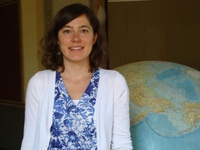
“In industrialized countries the massive occurrence of algal blooms in lakes has been successfully combated by the introduction of wastewater treatment and phosphate-free detergents”, says Huber, a research analyst for the director of PIK. She looked at whether climate change could reduce the success of these measures by producing similar effects to past cases of eutrophication. “One important finding is that changing local weather conditions are more important than the warming of the water itself.” However, many indicators suggest that detrimental algal blooms could occur more often as climate change progresses.

PIK is developing step by step its programme to support young scientists. In addition to intensive personal supervision, internal training on, for instance, interdisciplinary scientific approaches typical at PIK is central. Some linking of the PIK programmes with those of local universities is envisaged.
The prize received by Huber is named after the physicist and Nobel Laureate Albert Abraham Michelson, who, working in the astrophysical institute on Potsdam’s Telegraph Hill in the 19th century, laid one of the foundations of relativity theory. Today, PIK is housed in this historic building – and Huber works here too.





